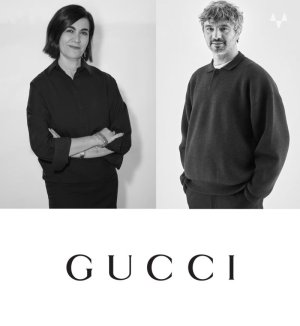BOF
Kering’s Woes Deepen as Gucci Sales Tumble 25%
Group revenues fell 14 percent in the first quarter as Saint Laurent and Balenciaga also suffered from the downturn in luxury demand.
Gucci Autumn/Winter 2025. (Getty Images)
By BOF
Robert Williams
23 April 2025
Gucci’s first-quarter sales fell 25 percent on a comparable basis as the label struggles to turn a corner in a rocky market for luxury, dealing another blow to owner
Kering after a difficult 2024: Sales at its flagship brand had already fallen by 21 percent last year.
Group sales fell 14 percent in the first quarter as other key units, including
Saint Laurent and
Balenciaga, also suffered from a downturn in luxury demand. Last week, rival
LVMH reported falling sales in its fashion division, down 5 percent in the first quarter.
“Traffic was weak across key regions. Against this tough backdrop our retail sales decelerated,” Kering chief financial officer Armelle Poulou said. Saint Laurent’s sales fell by 9 percent, while the group’s “Other Luxury” houses division including Balenciaga,
McQueen,
Boucheron and
Pomellato declined 11 percent.
Bottega Veneta continued to be a bright spot for Kering, with retail sales rising 7 percent. “Younger customers as well as VIPs contributed to growth,” Poulou said. Results for the group’s eyewear and beauty divisions also continued to inch up.
Gucci’s Elusive Turnaround
In a call with financial analysts, the focus remained squarely on Gucci, which still accounts for over 60 percent of Kering’s operating profit. The brand has struggled to turn its fortunes around under new management including a CEO brought in last year from Louis Vuitton,
Stefano Cantino.
Gucci missed out on luxury’s post-pandemic boom before watching its business drift since 2023 from stagnation to decline to freefall.
For Kering, the situation has become increasingly dire. Shares have tumbled 50 percent over the past year, and now “we are likely to see further caution applied to Kering’s earnings estimates given company specific issues compounded by a challenging luxury sector backdrop,” RBC analyst Piral Dadhania said in a note to clients. “The stock remains in wait-and-see mode until the new creative director at Gucci (
Demna) presents his first collection.”
Chairman François-Henri Pinault is likely to face tough questions tomorrow at the company’s annual shareholder meeting.
François-Henri Pinault and Stefano Cantino attending the Gucci Womenswear Autumn/Winter 2025 show. (Getty Images)
“The Gucci revival is yet to appear and will likely face a more difficult context as luxury consumer demand softens,” Bernstein analyst Luca Solca said.
Wednesday, the group had mostly incremental changes to report. Its pledge to reassert Gucci’s brand heritage has mostly materialised through campaigns stripped of the wonky styling associated with former designer
Alessandro Michele, as well as a revamped bag program.
Signs of progress this quarter included “low [price] resistance from the customers who came to stores, although traffic remained weak,” notably buying into a revamped, somewhat pricier monogrammed canvas line called “Emblem.” Management also called out a “joyful, yet elevated” campaign for a baguette-shaped variation of the brand’s “Bambou” line. Gucci threw a star-studded scarf party to celebrate its heritage in the silks category.
“We’re communicating the brand and its halo. You’ve seen the magnitude, the quality of what we’re doing,” Kering co-deputy CEO Francesca Bellettini said.
Amid the reinforced focus on pared-back, classic style, the brand’s fashion authority — long its biggest driver of consumer interest — has fizzled. A new creative director was named last month in a milestone moment for the house, but current Balenciaga designer Demna won’t officially arrive at Gucci before July, despite its increasingly dire trajectory.
It remains unclear how his provocative, pot-stirring take on luxury branding will square with the brand’s pledge to better balance timelessness and fashion buzz. While fashion insiders are aware of Demna’s innovative, sculptural silhouettes for Balenciaga, drawn from its founder’s archive, the average consumer is more aware of his chunky sneakers and streetwear, whose appeal has gradually tired over a decade at the brand.
Success will depend largely on whether Demna can do something different, innovative and genuinely Gucci, without reversing the brand’s recent progress on boosting manufacturing quality and credibility at higher price points.
“Demna is going to build on the vision of the brand. It’s a build-up, not a cancellation [of previous efforts],” Bellettini said. “We are not waiting at Gucci to have Demna product... We’re going to keep having novelties arriving in the store, we’re going to keep innovating.”
The designer is set to deliver the first “hint” of his plan for the brand in September, Bellettini said. Precisely what format this will take remains unclear, though it seems unlikely to be a full-blown runway show.
US Demand
Across the group, Kering is racing to cut costs in proportion to a deteriorating top-line, saying its first-half margin would fall 500 basis points year on year but could improve slightly versus the second half of 2024. Corporate and brand functions are being merged, headquarters and regional duplications eliminated. The group closed 25 net stores including five outlets during the first quarter.
Buried beneath the gloomy numbers was one bit of welcome commentary on the broader state of the luxury market: While many have feared consumer uncertainty and stock market volatility linked to Trump’s trade war could tank the key US market, Kering said sales to Americans remained in line with late 2024 throughout the first quarter, and haven’t declined over recent weeks.
“We don’t see for the moment any change in trends, but knowing that volatility is not good for consumer confidence we stay vigilant,” chief financial officer Armelle Poulou said.
In China, “visibility is very limited” on the impact of trade tensions and stimulus measures, Poulou said. Sales in Japan slowed as the country annualised gains driven by booming tourist shopping, and as price gaps with other markets due to a weaker yen narrowed.
Gucci Owner Kering in Talks to Sell Stake in $1 Billion Fifth Avenue Property, Sources Say
The Italian luxury conglomerate is looking to sell a stake in a prestigious Fifth Avenue building it purchased last year as part of its strategy to cut costs amid heavy debts and sagging consumer demand, Reuters reported.
Kering’s net debt soared to €10.5 billion ($12 billion) by the end of 2024. (Getty Images)
By
Reuters (via BOF)
05 June 2025
Gucci owner Kering is in exclusive talks with buyout group Ardian about the sale of a stake in a prestigious Fifth Avenue building it bought just over a year ago, two people with direct knowledge of the matter told Reuters.
The negotiations are part of the French luxury group’s broad strategy to cut costs and sell stakes in prime real estate to help lower its heavy debt as the industry struggles with sagging consumer demand.
Kering and Ardian declined to comment.
Kering, controlled by family of CEO Francois-Henri Pinault, bought 715-717 Fifth Avenue in January 2024 for $963 million to secure a top retail location in one of the world’s most popular shopping streets.
The property stretches over 115,000 square feet across several stores.
Kering’s net debt soared to €10.5 billion ($12 billion) by the end of 2024, from close to zero three years earlier, following a shopping spree that saw roughly €4 billion spent on top properties in New York, Milan and Paris.
Deputy CEO Jean-Marc Duplaix said earlier this year that Kering expects to raise €2 billion or more over the next two years through real estate transactions.
Under a deal struck in January, Paris-based Ardian took a 60 percent stake in a joint venture with Kering containing three prestigious Paris properties, raising €837 million for the luxury group, which retained a 40 percent stake.
The New York property discussions are also about the sale of a stake, said the sources, declining to comment on the value of the possible transaction or size of the stake under discussion.
“We continue to work not to resell these assets, but to sell part of them and have a co-shareholder,” Duplaix told shareholders in April. He added that the properties in Milan’s Via Montenapoleone and on the Fifth Avenue were among the buildings under discussion, as well as real estate in Tokyo.
Duplaix said that maintaining a presence in the main shopping streets was essential for Kering’s brands, which also include Balenciaga and Saint Laurent.
According to Cushman & Wakefield, Via Montenapoleone in Milan was the world’s most expensive street for rents in 2024, followed by the upper-end of New York’s Fifth Avenue.









